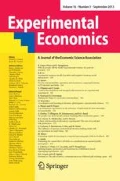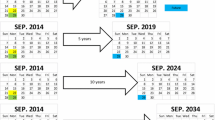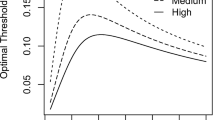Abstract
We use time, rather than money, as the salient component of subjects’ incentives in three workhorse experimental paradigms. The use of waiting time can be interpreted as a special type of real effort condition, in which it is particularly straightforward to achieve experimental control over incentives. The three experiments, commonly employed to study social preferences, are the dictator game, the ultimatum game and the trust game. All subjects in a session earn the same participation fee, but their choices affect the time at which they are permitted to leave the laboratory. Decisions that are associated with greater own payoff translate into the right to depart earlier. The modal proposal in both the dictator and ultimatum games is an equal split of the waiting time. In the trust game, there is substantial trust and reciprocity. Overall, social preferences are evident in time allocation decisions. We compare subjects’ decisions over time and money and find no significant differences in average decisions. The pattern of results suggests that results obtained in the laboratory with money as the medium of reward generalize to other reward media.


Similar content being viewed by others
Notes
This meant that the offending subject was required to wait in his cubicle for an additional 10 min. The penalty was implemented once.
This occurred for one subject.
Observations where the proposer proposed zero are not included.
Only observations where the proposer proposed a non-zero amount both in the money part and in the time part of a session in TG€10–60 are included.
References
Ariely, D., Loewenstein, G., & Prelec, D. (2003). ’Coherent arbitrariness’: Stable demand curves without stable preferences. Quarterly Journal of Economics, 118(1), 73–106.
Berg, J., Dickhaut, J., & McCabe, K. (1995). Trust, reciprocity, and social history. Games and Economic Behavior, 10(1), 122–142.
Berger, R., Rauhut, H., Prade, S., & Helbing, D. (2012). Bargaining over time in ultimatum game experiments. Social Science Research, 41(2), 372–379.
Berns, G., Capra, C., Moore, S., & Noussair, C. (2007). A shocking experiment: New evidence on probability weighting and common ratio violations. Judgment and Decision Making, 2(4), 234–242.
Bruyneel, A., Dewitte, S., Diecidue, E., & Festjens, A. (2013). About time: Individuals value risky time gains and losses linearly. Catholic University of Leuven, Mimeo.
Cooper, D. J., & Dutcher, E. G. (2011). The dynamics of responder behavior in ultimatum games: A meta-study. Experimental Economics, 14(4), 519–546.
Coursey, D., Hovis, J., & Schulze, W. (1987). The disparity between willingness to accept and willingness to pay measures of value. Quarterly Journal of Economics, 102(3), 679–690.
Engel, C. (2011). Dictator games: A meta study. Experimental Economics, 14, 583–610.
Oosterbeek, H., Sloof, R., & van de Kuilen, G. (2004). Cultural differences in ultimatum game experiments: Evidence from a meta-analysis. Experimental Economics, 7, 171–188.
Saini, R., & Monga, A. (2008). How i decide depends on what i spend: Use of heuristics is greater for time than for money. Journal of Consumer Research, 34(6), 914–922.
Smith, V. (1982). Microeconomic systems as an experimental science. American Economic Review, 72(5), 923–955.
Acknowledgments
We would like to thank ERIM for providing funds to conduct this experiment. Also, we thank Qi An and Ruud Knippenberg for their excellent research assistance. Finally, we would like to thank two anonymous referees and the editor for their useful comments.
Author information
Authors and Affiliations
Corresponding author
Electronic supplementary material
Below is the link to the electronic supplementary material.
Rights and permissions
About this article
Cite this article
Noussair, C.N., Stoop, J. Time as a medium of reward in three social preference experiments. Exp Econ 18, 442–456 (2015). https://doi.org/10.1007/s10683-014-9415-y
Received:
Revised:
Accepted:
Published:
Issue Date:
DOI: https://doi.org/10.1007/s10683-014-9415-y




